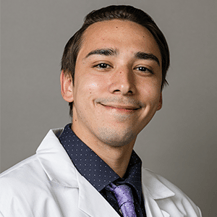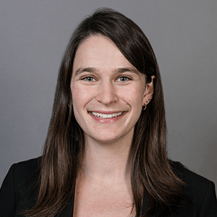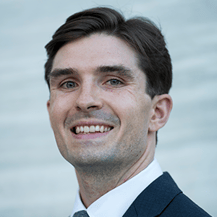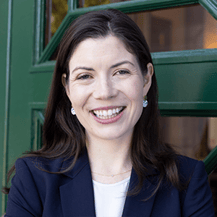Primary care is the first point of care for many. It has a direct impact on health equity and is uniquely positioned to help alleviate the impact of social determinants of health, manage chronic conditions, and help people live healthier lives. While there are physician shortages in the primary care field, there are still individuals who commit to this noble pursuit. Today, we honor recent recipients of the Robert H. Ebert, MD Student Achievement Award by sharing their insights on what makes primary care great.
Congratulations to
- Chai Arnold, MD, recipient of the HMS Center for Primary Care Robert H. Ebert, MD Student Achievement Award in Family Medicine
- Emma Hartswick, MD, recipient of the HMS Center for Primary Care Robert H. Ebert, MD Student Achievement Award in Primary Care, Pediatrics
- John Messinger, MD, recipient of the HMS Center for Primary Care Robert H. Ebert, MD Student Achievement Award in Primary Care, Internal Medicine
- Katherine Rich, MD, recipient of the HMS Center for Primary Care Robert H. Ebert, MD Student Achievement Award in Primary Care & Community Health
Chai Lee Arnold, MD
|
|
Why did you decide to go into medicine?
I decided to go into medicine after seeing the health problems of my parents when I was younger. It showed me how important our health is to our overall well-being and vitality in life, and I was fascinated to learn about the body and find ways to help people live more full lives.
Why did you decide to focus on primary care?
Primary care is the field in medicine that I think has the largest impact on the health trajectories of individuals and of communities. I loved the idea of having longitudinal relationships with patients, and I love how primary care medicine focuses on holistic health and well-being.
What was your favorite memory from your time at HMS?
I have had many amazing memories at HMS, but I think my favorite memory is our Class Match Day. It was so exciting to see all my friends match into their top programs, and then we all got to celebrate the rest of the day with our friends and family!
Where have you matched and what are you looking forward to at this location?
I will be doing my family medicine residency at UCLA Santa Monica. I am thrilled to be joining this program, which thrives at the intersection of academic medicine and community medicine. I will get a rigorous training experience and have many opportunities to work with the diverse communities of Los Angeles.
What do you hope to accomplish in this field?
I would like to establish myself as a great clinician and reliable family doctor in my hometown community. Beyond that, I hope to be involved in innovations in primary care delivery and re-thinking our current medical models so that we can re-emphasize preventative medicine and primary care.
What would you like to say to other students considering pursuing primary care?
Primary care is an extraordinary field. In a world where many people distrust health care, primary care doctors will be key in re-establishing trust with communities and helping people live healthier lives. It is a rigorous field that requires a deep knowledge base, but more importantly, a strong ability to communicate and handle emotionally heavy situations, not just with patients but also with other physicians and health care providers as well. I find it to be the most satisfying and rewarding field in medicine, and I hope you continue your journey in primary care and seek out diverse experiences to see if the field is right for you.
Emma Hartswick, MD
|
|
Why did you decide to go into medicine?
I’ve wanted to be a doctor since I was little—I love the art and science of how the human body works, and how people relate to one another. For me, medicine is incredibly rewarding because we get to work with others (colleagues and patients) and problem-solve together. I also was very lucky to have role models of physicians who served their community in and out of the clinic, which opened my eyes to the potential of clinician advocacy.
Why did you decide to focus on primary care?
I entered medical school planning to do primary care. I love the variety and continuity that primary care offers, and primary care’s commitment to finding creative solutions to whatever problems (medical, social or otherwise) that patients face. I love that we get to walk with patients through wellness and illness, and in Pediatrics, that we get to be part of helping young people grow up. I also resonate with the advocacy focus that is baked into primary care.
What was your favorite memory from your time at HMS?
I’ve enjoyed so many memories of my clinical experience, but I had a particularly wonderful time on an independent study in rural family medicine, where I got to work with incredible primary care clinicians in northern Maine and western Massachusetts.
Where have you matched and what are you looking forward to at this location?
I matched at the Boston Combined Residency Program in the Leadership in Equity and Advocacy Track. I’m looking forward to joining a community of dedicated pediatricians and advocates, and the opportunity to train at both Boston Medical Center and Boston Children’s Hospital.
What do you hope to accomplish in this field?
I hope to become an excellent clinician that my patients can count on. I’m passionate about safe, dignified, affordable housing and ending family homelessness. In my career, I hope to make progress toward the goal of housing justice by building partnerships between housers and clinicians, and advancing local policy solutions that support healthy housing.
What would you like to say to other students considering pursuing primary care?
The future of primary care is bright and offers so many opportunities to shape your career and life the way you want to. If you like a little bit of everything, you don’t have to choose! Primary care doctors play a meaningful and critical role in their patients' lives, and in the health care ecosystem, and being a part of the field is amazing!
John Messinger, MD
|
|
Why did you decide to go into medicine?
I followed in the footsteps of my mother, who was an oncology nurse at a small community practice in my hometown. When visiting her at work, I saw the care she provided for her patients and the meaning it gave them while struggling with severe illness.
Why did you decide to focus on primary care?
I was very interested in addiction medicine and caring for underserved populations when starting medical school. I found that primary care created an opportunity to engage with these patients who may otherwise struggle to access medical care and build meaningful, long-term relationships with them.
What was your favorite memory from your time at HMS?
My favorite memory from my time at HMS was working at Charlestown HealthCare Center. It is there that I found my passion for primary care and began to learn how primary care providers could serve as advocates for their patients to better engage with our powerful, yet complicated healthcare system.
Where have you matched and what are you looking forward to at this location?
I matched at University of California San Francisco in the San Francisco General Hospital Primary Care Track. I look forward to learning to practice medicine in a safety net setting while striving to provide excellent primary care regardless of the challenges my patients face and the resources at my disposal.
What do you hope to accomplish in this field?
I hope to change how we treat substance use disorders and people struggling with addiction in primary care settings. As medical providers, we can and should provide these patients with more compassion and more comprehensive treatment options than we do now.
What would you like to say to other students considering pursuing primary care?
There are an endless number of things to love and cherish about primary care. While there is much about our system that needs to be fixed, do not allow those things to deter you from primary care if you are passionate about it.
Katherine (Katie) Rich, MD, MPH
|
|
Why did you decide to go into medicine?
At the core, my motivation to go into medicine came from conversations I had with patients while completing my Master in Public Health degree. Prior to medical school, I worked on initiatives investigating barriers to care among patients with HIV and substance use disorders. In talking with patients at the clinics, as well as participants of my research, I found deep joy in building relationships and discussing ways to improve access to health care. I also had the privilege of working with physicians who advocated for their patients and their communities. These conversations and actions resonated with the career path that I hoped to take and pushed me to apply to medical school.
Why did you decide to focus on primary care?
The relationships! And the ability to offer patients and communities preventative care. In my career, I hope to provide care in low-threshold settings to expand access to care for folks who are incarcerated and those who have a substance use disorder. Primary care is the ideal field to provide me with the training and community to do this work.
What was your favorite memory from your time at HMS?
One of my most meaningful experiences at HMS has been the time I spent at Suffolk County Jail at Nashua Street, talking to individuals about health and ways to connect to care in the community. Other highlights of my time at HMS include meeting with State Representative Santiago with other classmates to advocate for overdose prevention sites, and time spent with friends over shared meals.
Where have you matched and what are you looking forward to at this location? I will be a resident at Massachusetts General Hospital within the Primary Care program. I am thrilled to have the opportunity to train at a hospital with a robust network of community clinics and strong clinical training. I am very excited to meet my new colleagues.
What do you hope to accomplish in this field?
I hope to help improve health outcomes for people who are incarcerated and folks who inject drugs. I hope that at the end of my career I can look back and be proud of the work I’ve done to improve access to high-quality care and to build systems that provide care beyond traditional settings.
What would you like to say to other students considering pursuing primary care?
I found wonderful mentorship among clinicians working on community-based projects that modeled different possible career pathways, both here at Harvard and within the wider Boston community. I am happy to talk about connecting with folks to anyone that might find this helpful.
Interested in other articles like this? Subscribe to our newsletter
Interested in contributing to Perspectives in Primary Care? Review our submission guidelines
- Share
-
Permalink






